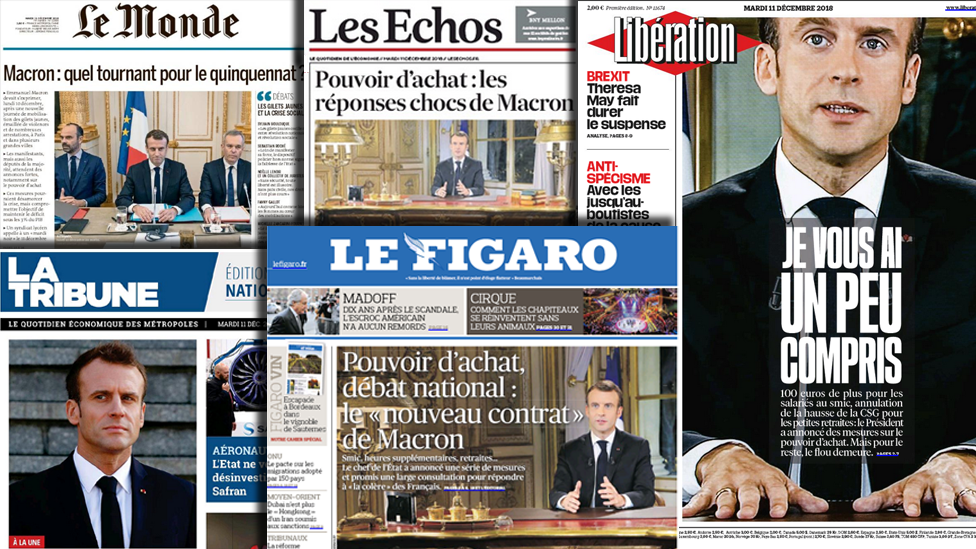France gilets jaunes: Press weigh Macron's 'risky gamble'
- Published

The French press sees risks in President Emmanuel Macron's fresh pledges to increase the minimum wage and ease the tax burden for the poorest in the wake of weeks of violent protests.
Some papers assess his 10 December address to the nation as a gamble that might not satisfy most yellow-vest protesters, while being sure to disturb the European Commission.
Liberal and centre-right commentators in particular are concerned at the cost of the president's "generosity".
'Morsel of bread'
The left-wing Liberation daily mocks the president with a reference to President Charles de Gaulle on its front page: "I have understood you - a bit".
says the address showed a "change in tone" but not in the president's programme of reforming the state sector and labour laws, adding that it remains unclear where the money will be found to implement the measures.
Editor insists that the president "is starting to understand" the French, and that his measures are not the "breadcrumbs" that his critics claim but rather a "morsel of bread for those who badly need it".
Mr Joffrin nonetheless doubts that this will be enough to end the protests anytime soon.
Francoise Fressoz of the centre-left , in contrast, says the concessions in fact "yield nothing".
She dubs the pledge to increase the minimum wage by Ôé¼100 ($114; ┬ú90) a month "symbolic" and designed to surprise the nation, as senior officials had ruled it out only hours earlier.
Like Liberation, Ms Fressoz says at no point did President Macron question the "philosophy of his policies", but rather insisted on the need to continue his reforms.
She thinks he "runs the risk of seeing the conflict continue while he counts on the protest movement falling apart or becoming more extreme".
'Price to pay'
Alexis Brezet, editor of the centre-right , comes to the president's aid.
He praises Mr Macron's attempt to "rebuild the bond" with the nation and "show his love" by not resorting to half-measures.
"Obviously, all this generosity comes at a high cost... But if this is the price to pay for restoring civil peace in the country, who can complain?" he writes.
Mr Brezet sees the crux as being whether the measures will convince the protesters to quit: "Their stubbornness has spoiled too many prophecies to make it worth predicting what will happen next, but we can only wish it will be so".
The business daily calls the pledges "shock measures", and estimates it will cost Ôé¼11bn ($12.5bn; ┬ú9.9bn) to fund them.
As the deficit may reach 3.5% of GDP next year, France's image in Brussels looks likely to take a serious hit, it says.
The newspaper's says Macron's "massive gesture" is aimed at "saving his five-year presidential term, if that is still possible", and thinks he may even sacrifice some of the progress he has already made in the past 18 months in order to end the stand-off.
reports and analyses news from TV, radio, web and print media around the world. You can follow ┤¾¤¾┤½├¢ Monitoring on and .